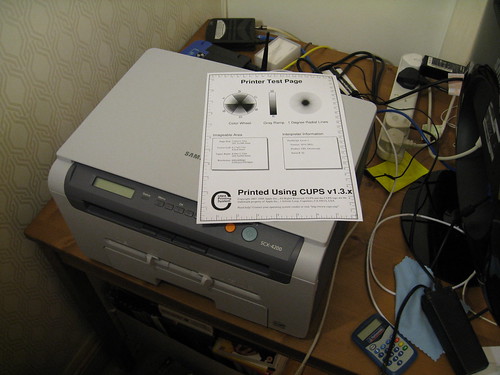Update: Recently upgraded CUPS to 1.4? See http://wiki.archlinux.org/index.php/Cups#USB_printers_under_CUPS_1.4.x
I bought a Samsung SCX-4200 after I heard it had Linux driver support.
The multi-function printer costs about 62GBP (ex VAT), so it's quite cheap for a laser printer.
From Samsung's terrible support Website, the CUPS driver described as build date : 2008-09-11 Unified Linux Driver. Though the driver seems to date from 2007:
d5e3343099e86317e2068097e017ecb3 20070720152943906_UnifiedLinuxDriver.tar.gz
So I am guessing Samsung screwed up the deployment. Anyway after extracting the
driver I read through ./cdroot/Linux/install.sh. You should never ever run
shell scripts as root from an untrusted source, without at the very least
carefully reading the file. After reading this bloated file, I was not prepared to
execute it. What a horrific mess of an install. Suck less Samsung.
So I know from previous experience with CUPS, that it generally just needs a "ppd" configuration file. So I found a likely suspect:
x61:~/Desktop/samsung% sudo find . -name 'scx4200.ppd'
./cdroot/Linux/noarch/at_opt/share/ppd/scx4200.ppd
And via the CUPS administrator printing interface http://localhost:631/ installed it. So
far so good. Then an error occured that rastertosamsungspl could not be
found. After searching around I found the binaries:
x61:~/Desktop/samsung/cdroot/Linux/i386/at_root/usr/lib/cups/filter% ls
pscms* rastertosamsungpcl* rastertosamsungspl* rastertosamsungsplc*
x61:~/Desktop/samsung/cdroot/Linux/i386/at_root/usr/lib/cups/filter% sudo cp * /usr/lib/cups/filter
And copied them into the place where install.sh was trying to put them. And guess what? It works. :) Is the black hole binary a rootkit? Who knows! :(
rastertosamsungspl and friends use an insane amount of shared libraries:
x61:~% ldd /usr/lib/cups/filter/rastertosamsungspl
linux-gate.so.1 => (0xb7fd7000)
libcups.so.2 => /usr/lib/libcups.so.2 (0xb7f8b000)
libcupsimage.so.2 => /usr/lib/libcupsimage.so.2 (0xb7f73000)
libc.so.6 => /lib/i686/cmov/libc.so.6 (0xb7e17000)
libgssapi_krb5.so.2 => /usr/lib/libgssapi_krb5.so.2 (0xb7ded000)
libkrb5.so.3 => /usr/lib/libkrb5.so.3 (0xb7d59000)
libk5crypto.so.3 => /usr/lib/libk5crypto.so.3 (0xb7d35000)
libcom_err.so.2 => /lib/libcom_err.so.2 (0xb7d32000)
libgnutls.so.26 => /usr/lib/libgnutls.so.26 (0xb7c95000)
libpthread.so.0 => /lib/i686/cmov/libpthread.so.0 (0xb7c7b000)
libm.so.6 => /lib/i686/cmov/libm.so.6 (0xb7c55000)
libcrypt.so.1 => /lib/i686/cmov/libcrypt.so.1 (0xb7c23000)
libz.so.1 => /usr/lib/libz.so.1 (0xb7c0e000)
libtiff.so.4 => /usr/lib/libtiff.so.4 (0xb7bb9000)
libpng12.so.0 => /usr/lib/libpng12.so.0 (0xb7b95000)
libjpeg.so.62 => /usr/lib/libjpeg.so.62 (0xb7b76000)
/lib/ld-linux.so.2 (0xb7fd8000)
libkrb5support.so.0 => /usr/lib/libkrb5support.so.0 (0xb7b6e000)
libdl.so.2 => /lib/i686/cmov/libdl.so.2 (0xb7b6a000)
libkeyutils.so.1 => /lib/libkeyutils.so.1 (0xb7b67000)
libresolv.so.2 => /lib/i686/cmov/libresolv.so.2 (0xb7b52000)
libtasn1.so.3 => /usr/lib/libtasn1.so.3 (0xb7b42000)
libgpg-error.so.0 => /usr/lib/libgpg-error.so.0 (0xb7b3e000)
libgcrypt.so.11 => /usr/lib/libgcrypt.so.11 (0xb7ad6000)
As the operating system evolves one of these depedencies is bound to break. Samsung should have either:
- Statically built the binaries
- Made the source freely licensed and available
Preference goes to the second option. For example Webconverger cannot distribute a binary blob of a printer driver, so this printer cannot be supported. So I want the source please, Samsung.
The print quality is satisfactory thought the printer had a noisy fan blaring after just one print test page. In such cases I just turn the printer off.
Next I need to try the scanning ability of the device. scan-utils's sane-find-scanner finds:
found USB scanner (vendor=0x04e8 [Samsung], product=0x341b [SCX-4200 Series]) at libusb:003:004
Well done. Though sadly:
x61:~% sudo scanimage -L
No scanners were identified.
Again looking at install.sh another proprietary blob (with a FECK load of deps):
x61:~/Desktop/samsung/cdroot/Linux/i386/at_opt/bin% ldd smfpscan
linux-gate.so.1 => (0xb7fac000)
libdl.so.2 => /lib/i686/cmov/libdl.so.2 (0xb7f92000)
libqt-mt.so.3 => /usr/lib/libqt-mt.so.3 (0xb7899000)
libpthread.so.0 => /lib/i686/cmov/libpthread.so.0 (0xb787f000)
libXext.so.6 => /usr/lib/libXext.so.6 (0xb7871000)
libX11.so.6 => /usr/lib/libX11.so.6 (0xb7782000)
libstdc++.so.5 => /usr/lib/libstdc++.so.5 (0xb76c8000)
libm.so.6 => /lib/i686/cmov/libm.so.6 (0xb76a2000)
libgcc_s.so.1 => /lib/libgcc_s.so.1 (0xb7695000)
libc.so.6 => /lib/i686/cmov/libc.so.6 (0xb7539000)
/lib/ld-linux.so.2 (0xb7fad000)
libfontconfig.so.1 => /usr/lib/libfontconfig.so.1 (0xb750f000)
libaudio.so.2 => /usr/lib/libaudio.so.2 (0xb74f9000)
libXt.so.6 => /usr/lib/libXt.so.6 (0xb74a9000)
libjpeg.so.62 => /usr/lib/libjpeg.so.62 (0xb748a000)
libpng12.so.0 => /usr/lib/libpng12.so.0 (0xb7467000)
libz.so.1 => /usr/lib/libz.so.1 (0xb7451000)
libXi.so.6 => /usr/lib/libXi.so.6 (0xb7449000)
libXrender.so.1 => /usr/lib/libXrender.so.1 (0xb7440000)
libXrandr.so.2 => /usr/lib/libXrandr.so.2 (0xb743a000)
libXcursor.so.1 => /usr/lib/libXcursor.so.1 (0xb7431000)
libXinerama.so.1 => /usr/lib/libXinerama.so.1 (0xb742e000)
libXft.so.2 => /usr/lib/libXft.so.2 (0xb741a000)
libfreetype.so.6 => /usr/lib/libfreetype.so.6 (0xb73a5000)
libSM.so.6 => /usr/lib/libSM.so.6 (0xb739d000)
libICE.so.6 => /usr/lib/libICE.so.6 (0xb7386000)
libstdc++.so.6 => /usr/lib/libstdc++.so.6 (0xb7298000)
libXau.so.6 => /usr/lib/libXau.so.6 (0xb7294000)
libxcb-xlib.so.0 => /usr/lib/libxcb-xlib.so.0 (0xb7292000)
libxcb.so.1 => /usr/lib/libxcb.so.1 (0xb727a000)
libexpat.so.1 => /usr/lib/libexpat.so.1 (0xb7254000)
libXfixes.so.3 => /usr/lib/libXfixes.so.3 (0xb724f000)
libXdmcp.so.6 => /usr/lib/libXdmcp.so.6 (0xb7249000)
Seems required. Argh... no :( Why are things such a nightmare? I'm not any closer in restoring a supported print service in maxi. :/
I guess I should have done my research better. After living in Korea I know Korean programmers do not have much experience of Linux and the Web unfortunately due to several reasons like ActiveX lock in. So I will try get the sources to their driver otherwise I'll quickly have a 5kg hunk of useless plastic on my desk.
Trouble shooting tip: Failed to load the PPM image means you are missing ghostscript.
Update: I've noticed via the ArchLinux splix package that there is an opensource implementation of the Samsung Printer Language drivers. Awesome!
